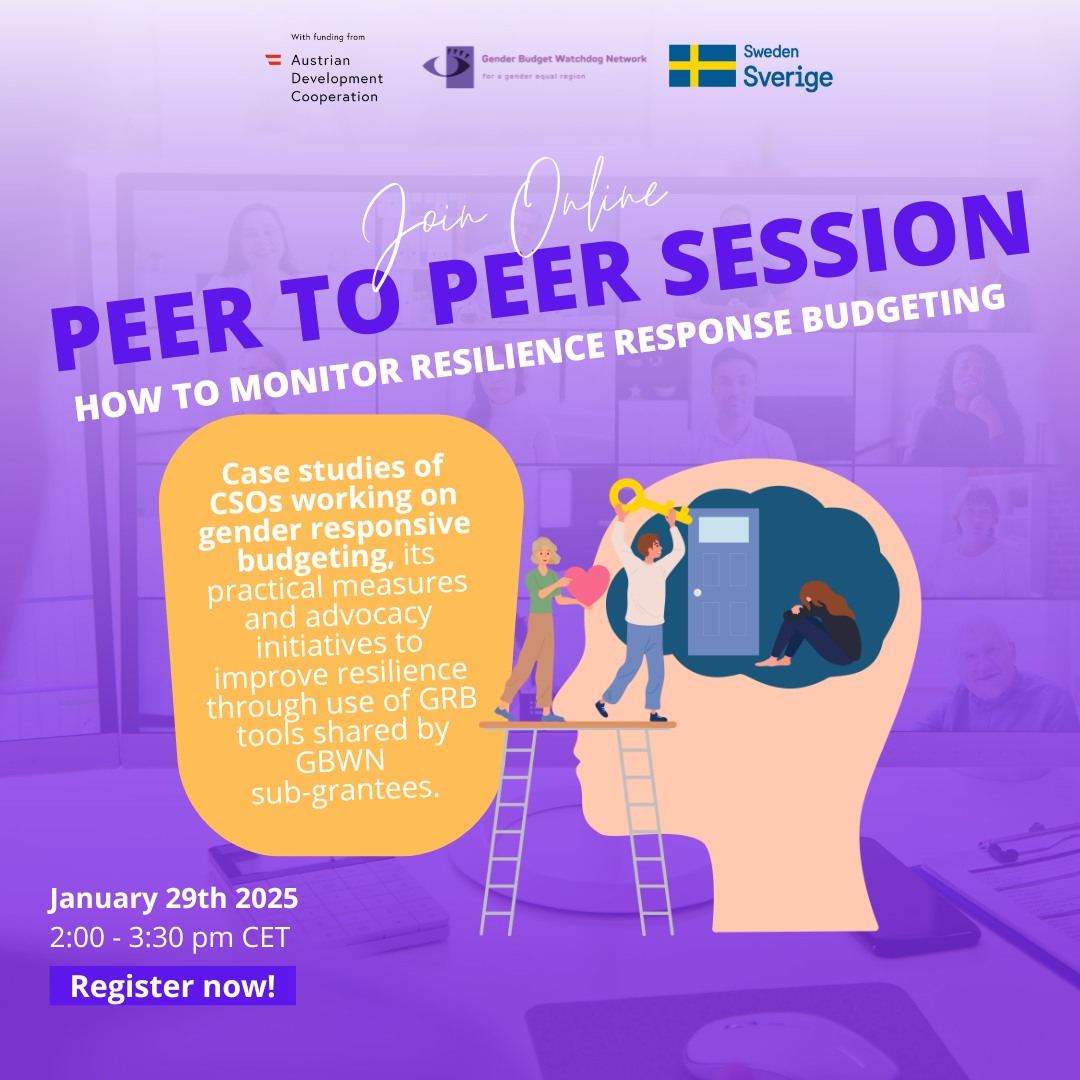On January 29, 2025, the Gender Budget Watchdog Network (GBWN) hosted a dynamic and insightful webinar titled “Case Studies of Civil Society Organizations’ GRB Work in Resilience Response” focused on women, youth, and marginalized communities. The event brought together civil society organizations from across the Western Balkans and Moldova, highlighting their transformative use of Gender-Responsive Budgeting (GRB) tools in times of crisis. The webinar was a platform for knowledge-sharing, collaboration, and reflection on practical strategies for advancing gender equality, resilience, and inclusive governance.
Throughout the webinar, participating organizations presented field-based research and local advocacy experiences. These case studies demonstrated how civil society actors are not only watchdogs but also drivers of structural change at local and national levels. The following CSOs presented their work, as part of our sub-granting scheme:
- Priroda Women’s Association – Bosnia and Herzegovina
With more than two decades of grassroots work in Bratunac, Priroda showcased how their cooperative OPZ Žena, a social enterprise founded by women farmers, contributed to both economic empowerment and climate resilience. Their advocacy led to gender-responsive criteria in agricultural subsidies and secured municipal funding for women survivors of violence and war. - EcoVisio – Moldova
EcoVisio shared the findings of their research on gender disparities in agricultural financing. By identifying systemic barriers, their work provided concrete policy recommendations aimed at improving access to financial resources for women in agriculture and rural development. - NGO Mosaic Nikšić – Montenegro
Mosaic Nikšić’s presentation focused on budget analysis in Nikšić municipality, where they revealed significant gaps in the so-called “gender-neutral” budgets of key departments. Their proposed GRB measures emphasized the importance of tailoring budget allocations to meet the real needs of both women and men in the community. - Mitrovica Women Association for Human Rights (MWAHR) – Kosovo
MWAHR highlighted their efforts to increase women’s participation in public hearings and local budget processes. Through their GRB initiative, they were able to influence more inclusive budgeting practices and build stronger engagement between women citizens and municipal institutions. - Women’s Association of the Kolubara District (ŽUKO) – Serbia
ŽUKO addressed how gender perspectives can be integrated into disaster risk management—an often male-dominated field. Their project across three municipalities tackled the specific vulnerabilities of women during floods and earthquakes and proposed structural improvements in emergency planning. - Women’s Forum Elbasan – Albania
Focusing on institutional practices, the Women’s Forum Elbasan shared their research on GRB implementation across seven municipalities in Elbasan County. Their findings included key recommendations for local governments to improve socio-economic support and address gender-based disparities in public finance. - Center for Research and Analysis NOVUS – North Macedonia
NOVUS presented a compelling case on the exclusion of rural and marginalized communities from policy-making during crises. Their research emphasized the need for greater transparency and participatory governance, particularly for youth and socially excluded groups
Key Takeaways
- Civil society organizations are leading actors in applying GRB tools to promote equality and build community resilience.
- Inclusive budgeting requires deliberate action—especially in times of crisis when inequalities are often deepened.
- The experiences shared confirmed the importance of local research and advocacy in influencing policy changes and funding priorities.
- GRB is not only a technical tool but a transformative approach for shaping equitable and sustainable development.
The webinar reinforced GBWN’s commitment to strengthening CSO capacities and elevating grassroots voices in budget monitoring and advocacy. It also highlighted how cross-border collaboration can lead to shared learning and stronger regional responses to economic and climate-related challenges.
For those who missed the live event, watch the recording and read the summary report.


